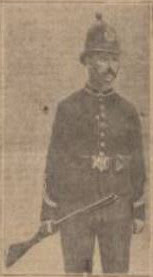The local Newspapers regularly report on the meetings of the Dorset Standing Committees. Among other responsibilities this committee is responsible for the police budgets, including major purchases and expenditures. The reports of the committee meetings enables us to get a insight into the Dorset police force in the 1930s. Using newspaper reports gives us an impression but can be incorrect or give the view of the reporter and therefore need to be read with care.
We can not look at Grandad Beck’s life and work without considering the wider context. In 1930 Britain was hit by a world recession caused in part by the stock market crash in the USA. Britain was less effected than other countries and here in the South West the depression wasn’t has bad as in the North of England, Scotland, Northern Ireland and Wales. Nevertheless Grandad Beck and the people of West Dorset would have felt the effect. The Police were effected directly when their pay was cut, twice. Yet despite these cuts the pay of Dorset policemen had significantly increased since World War One due.
Grandad Beck retired in July 1935 and the Dorset Constabulary used this to reduce the number of Division and therefore superintendents.
Police Budgets and Pay
In July 1931 the Standing Committee discusses the police budget in regards to recent figures published which showed that
the expenditure on the police in Dorset was four times what it was in 1914, whereas the average increase of counties in England was three times above the pre-war figure.The county accountant was asked to explain the increase. The reasons given were that Weymouth Borough Police Force had been amalgamation into the Dorset Constabulary in 1921. Dorset had lower rates of pay in 1913-14 and the subsequent increase in pay to the flat-rate, and therefore pensions, had been higher than other forces. From
1920 the Committee inaugurated a scheme for purchasing or erecting police houses, and up to the 31st March 1930 had spent upwards of £40,000 in this direction. Formerly they rented cottages in different villages, often at almost nominal rent, but owning to the shortage of houses in recent years the only course had been to purchase or erect dwellings for their men.Later the same year, (1931) police pay was reduced by 5%.
In October 1931 the committee heard that The reduction in salaries of the Police Force as part of the national economy movement. The Chairman, Colonel T. A. Colfox, said that the pay of all ranks in the force throughout the country had been reduced by the Government by 5 per cent of thereabouts. The police as one felt sure they would, had realised the situation and accepted the reductions without any remonstrance or murmur any sort. The following year police pay was further reduced by 5% on November 1st 1932.
In February 1934 Dorset Standing Joint Committee resolved to ask the Home Secretary to restore the full pay to the police force.
That this Committee, having considered the representation of the Dorset Constabulary Branch Board of Police Federation …desire to represent to the Home Secretary their view that the question of the restoration of the full pay of the police should be favourably considered at the earliest possible date which His Majesty’s Government are of opinion the financial position renders possible. The ‘cuts’ were said to be inflicted for a specific time of crisis - to tide the country over a period of financial difficulty. We submit that this time of crisis has now definitely passed.Major Mansell pointed out that when the “cuts” were made the cost of living was between 55 and 60 per cent, above the pre-war level. It was now 30 per cent., and, in consequence, the police were really no worse off than they were in 1931.Lack of promotion
The Standing Committee were concerned with the lack of promotion within Dorset Constabulary. This was an ongoing concern and expressed many times in the reports. For example May 1935
A fear of promotion in the police force in the county being stagnated was expressed by Mr L Skyrm. It must have a deadening effect on the younger members of the force when they saw there was not much chance of getting to rank which mattered.Even so when Superintendents did retire Dorset Constabulary reduced the number of Divisions, replacing the Superintendent with a Inspector. In November 1934 the Superintendent at Wimborne retired, the Chief Constable proposed to station an Inspector at Blandford, instead of a Superintendent. Again when Grandad Beck retired in 1935 Dorchester and Wareham divisions were amalgamated under one Superintendent at Dorchester. Sergt. Burt was promoted to inspector and placed in charge of Wareham and Supt. T Cater of Wareham to move to Bridport. Therefore by July 1935 there were 6 Superintendents. Bridport, Poole, Dorchester, Weymouth, Sherborne and Wimborne.
The Standing Committee also noted in July 1935 the proportion of policemen to members of the population:
Swanage 1 to 961
Shaftesbury 1 to 1,168
Blandford 1 to 1,013
Bridport 1 to 986
All original content by Sylvia Collins is copyright protected.References Quotes in Italics:Western Gazette: July 31 1931 p11; October 30 1931 p11; Nov 2 1934 p11; July 26, 1935 p11Bridport News February 9 1934 p8
Great depression in the United Kingdom (2016) in Wikipedia. Available at: https://en.wikipedia.org/wiki/Great_Depression_in_the_United_Kingdom (Accessed: 1 April 2016).


[…] This wasn’t the end of the cuts in the police budget and police pay was cut again in 1931 as I wrote in “Dorset Police Pay and Promotion during the Great Depression” […]
ReplyDelete